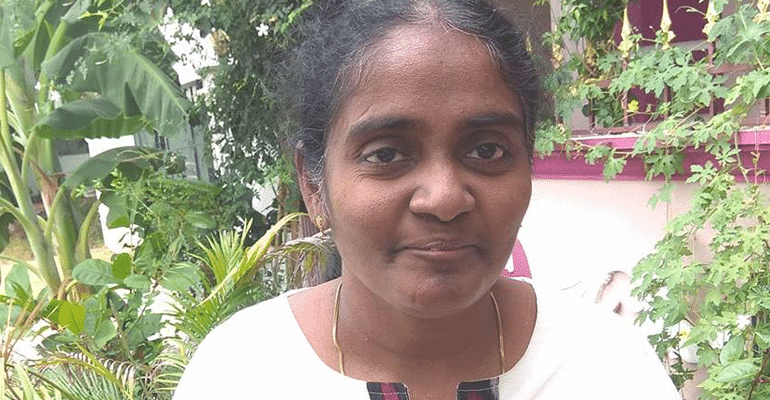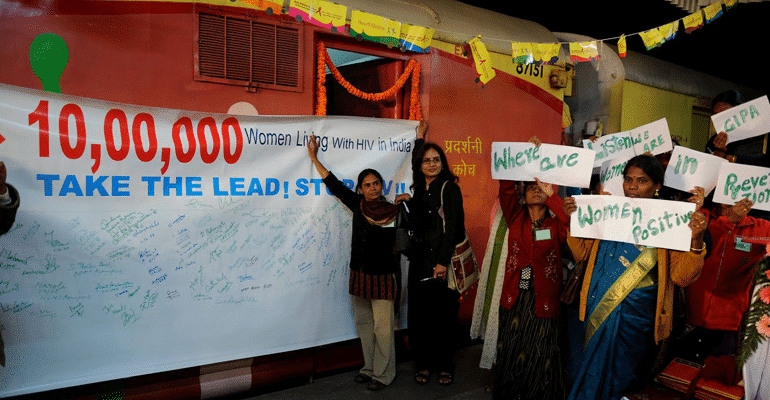She was just 2 years old when she lost her mother. Her father remarried and she was mistreated by her stepmother. By the age of 19, she was married to a lorry driver, and relatives ensured her that it was her deceased mother’s wish that she should marry him.
Only after two weeks of her marriage, she fell ill and on consulting the doctor, she came to know she was HIV+. Later, she discovered that her husband knew he was carrying the HIV virus before their wedding, but didn’t inform the family or her for obvious reasons. When she shifted to her grandparent’s home, her husband came there to inform her that he is going to marry again, but the marriage couldn’t take place either, and after 7 months, he committed suicide.

Instead of blaming herself for someone else’s deeds, this teenage widow stood up, fought for her rights and became the first woman in India to disclose her HIV positive status. Not just that, till now, she has changed the fate of more than 30,000 HIV+ women and children who were stripped of dignity.
In an exclusive interview with Life Beyond Numbers, Kousalya Perisamy, founder of Positive Women Network tells us how she fought her infection along with a male-dominated social order.
Staying positive
“I am a 46-year-old HIV positive woman and every day I am learning from the stories of my life,” says Kousalya with a smile, who hails from Namakkal district of Tamil Nadu.
While most HIV+ people face a crisis of courage and all they can visualize is having a painful death, Kousalya is living her life to the fullest, perhaps in the best possible way, setting an example for people who are infected with the virus.
“24 years back, it was extremely difficult for an HIV+ woman to survive with dignity in a society, which believed that AIDS was contagious and people infected with it have loose morals,” she says. “Myths and taboos surrounding this issue were so deep-rooted that even doctors refused to help the patients infected with the virus.”
Mourning doesn’t teach you about confidence and resilience, knowledge does. With the hope to share her stories and inspire HIV+ women to live a dignified life, in 1998, Kousalya started Positive Women Network (PWN+) in Chennai along with the help of three other women, Varalakshmi, Jones and Hema.
PWN is an All-India network of HIV positive women, focused on improving the quality of life of women and children living with HIV/AIDS. It supports women infected with the virus, helps them fight for their rights and sensitizes the society about their needs by conducting support group meetings and campaigns.
Standing in solidarity with HIV+ people
The treatment of HIV has advanced, so why the stigmas and the myths attached to it haven’t finished yet? One doesn’t have to be in the closet, everyone can talk about the issue.
“In the beginning, like other women, I used to cover myself up from people in fear of discrimination, but slowly I pulled myself out of it and decided to do something about it.”
When you have knowledge about the problem, it is easier to tackle it. Lack of knowledge results in fear. If you take proper medicines and go for checkups, HIV can be controlled to a great extent.
“I have seen HIV+ women living with the disease, dying with the disease because society fails to accept their HIV positive status and in most of the cases their families throw them out of their house. Getting a rental home also becomes a headache for people like us,” recalls Kousalya.
While narrating a 7-month-old incident, she says, “I was staying in a girl’s hostel. At first, everything was normal. I cooked for other people at times and we shared food as well, but once, I shared my HIV positive status, everything changed. There is so much stigma attached to this issue in this country that we have a long way to go before things get better.”
The impact
“Even today HIV+ women and children are mocked at or made fun of. But, one good thing is women are now confident to come forward, share their real identities, name, and photos as well while discussing the issues and connecting with us. This was the primary idea behind PWN+,” says Kousalya.
If you look a decade back, there were certain medical departments who were discriminating against people affected with HIV and not offering them beds or assistance when needed. “Even if we were planning to do something for these women while getting them admitted or arranging medicines from them, we had to approach people in power to get things done,” she says.
It was in 2002 that the government started treating HIV+ pregnant women and one year later, the Tamil Nadu government reduced the state tax for ART single-dose medicines.
To give a clear understanding of the picture, Kousalya recalls how she was down with TB and meningitis in 1999. While everyone thought, she won’t be able to survive as the medicines were priced at Rs.7,500 at that time. “But, thankfully my uncle paid for the medicine back then, so I could afford the treatment. Now the same medicine costs just Rs.300.”
In 2003, The Children’s Investment Fund Foundation (CIFF) and Kilpauk Medical College teamed up to provide free treatment of HIV+ children and their mothers also got benefitted it.
In 2004, for the first time, ART medication was implemented on HIV+ patients in Tambaram Sanatorium hospitals in Chennai and JJ hospital in Mumbai, and depending on the results the medication was approved by other states.
In May 2006, one of its kind, a four-day consultation programme was organized by PWN+ and supported by UNICEF. It was a forum for children affected by HIV to share their experiences, concerns, and feelings about the challenges they face.
Today because of Kousalya’s selfless efforts, PWN+, and other support groups, 80 percent of government hospitals in all districts pan India offer free treatment to people infected with HIV. Also, the Planning Commission took notice of the requirements of HIV+ women and children and included these needs in the Twelfth Plan in 2012-2017.
Being HIV+ herself, Kousalya has incredible outreach to the people who are directly living with the effects of the virus because people were somehow able to detach themselves from the stigma associated with it.
“Not only HIV+ women were benefitted from this initiative, but the ones who were non-HIV also found hope and courage to look at life from a different perspective when they were going through emotional difficulties. People recognize me, come forward and thank me that I have changed their lives. Some cry out of happiness, this fills my heart with joy,” concludes Kousalya.
Kousalya’s life and work is an example that something good always comes out of something terrible. Life is what you make of it and knowledge is like an anchor that helps you to sail smoothly in tough times.


